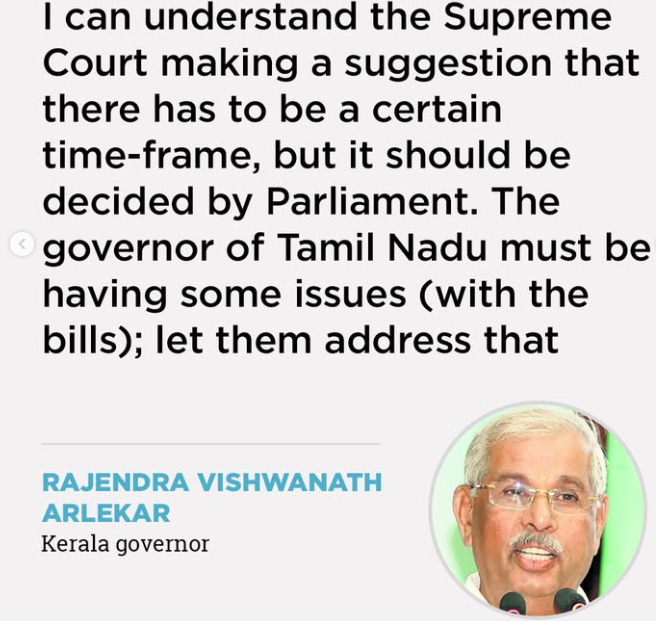Tamil Nadu Government Notifies 10 Pending Laws Following Supreme Court Order — A Historic First in India
In an unprecedented move, the Tamil Nadu Government has officially notified the operation of 10 legislative Acts, following a landmark Supreme Court judgment. This action comes after the apex court ruled that these bills are “deemed” to have received assent from Governor RN Ravi, citing his prolonged delay and an unconstitutional referral to the President.
The notification was issued by the state government today, soon after the Supreme Court uploaded its detailed verdict late last night. This marks the first instance in Indian history where a state government has operationalized laws based solely on a court directive, bypassing the Governor’s formal assent.
The Supreme Court’s decision not only reinforces the legislative powers of elected state governments but also sets a precedent in dealing with delays and constitutional overreach by Governors. This bold move by the Tamil Nadu Government signals a new era of judicial intervention in safeguarding the democratic process.
The Tamil Nadu Government has notified the operation of 10 Acts, which the Supreme Court declared as “deemed” to have been assented to by Governor RN Ravi in view of the Governor’s prolonged delay in clearing them and his unconstitutional reference to the President.
The notification was issued by the Government today after the Supreme Court uploaded its judgment yesterday night. It is for the first time in Indian history that a State Government is operationalising laws based on a Court order instead of Governor’s assent.
Why the Supreme Court Clarified That Its Timelines for Governors on Bills Do Not Amend the Constitution
The Court emphasized that any intentional delay or inaction by the Governor must be seen as a significant threat to the federal structure of the nation.
Supreme Court Sets Timeline for Governors to Act on Bills Under Article 200
In a significant judgment, the Supreme Court of India has laid down a crucial guideline requiring Governors to act within a reasonable timeframe on bills passed by state legislatures. The verdict ensures that undue delays in granting assent to bills will now be open to judicial scrutiny.
The ruling revolves around Article 200 of the Indian Constitution, which outlines the actions a Governor must take when a bill passed by the state legislature is presented for approval. Although Article 200 does not specify a timeframe, the Supreme Court made it clear that inaction is not acceptable.
A bench comprising Justices JB Pardiwala and R Mahadevan emphasized that the constitutional provision cannot be interpreted in a way that allows Governors to indefinitely withhold assent, thereby obstructing the legislative process of a state.
“The prescription of a time-limit is with a view to ensure that the Governor is not conferred with the power of exercising a pocket veto under the scheme of Article 200, and hinder the law-making process in the State without the existence of any reasonable grounds,” the bench stated.
The Court further noted that this directive safeguards state governments from arbitrary, malicious, or capricious actions by Governors, and ensures a proper check and balance through judicial review if necessary.

This landmark ruling is expected to enhance accountability and streamline the legislative process across Indian states.
Supreme Court Prescribes Clear Timelines for Governors on Assent to Bills
In a significant judgment dated April 8, the Supreme Court has laid down clear timelines to be followed by State Governors in dealing with bills passed by State Legislatures. Drawing from recommendations made by the Sarkaria Commission (1988) and the Punchhi Commission (2007) on Centre-State relations, the Court emphasized the need for timely decision-making to uphold constitutional propriety.
The prescribed timelines are as follows:
- On Withholding Assent or Reserving a Bill (on the Advice of the State Cabinet):
The Governor must act immediately and no later than one month from the date of receiving the advice of the State Council of Ministers. - On Withholding Assent (Contrary to Cabinet Advice):
If the Governor decides to withhold assent against the advice of the State Council of Ministers, the bill must be returned with a message within a maximum of three months. - On Reserving a Bill for the President’s Consideration (Contrary to Cabinet Advice):
In such cases, the Governor must make the reservation within three months of receiving the bill. - On Reconsideration of a Returned Bill:
When a bill is presented again after reconsideration by the State Legislature, the Governor is required to grant assent forthwith, and at most within one month.
Why the timeline directions don’t amount to judicial overreach
Supreme Court Clarifies Timelines for Governor’s Action Under Article 200 Not a Constitutional Amendment
In a significant observation, the Supreme Court acknowledged that setting timelines for the Governor’s actions under Article 200 of the Constitution might appear as if the judiciary is introducing a provision not explicitly stated in the constitutional text. However, the Bench clarified why this interpretation does not equate to a constitutional amendment.
The Court emphasized that prescribing a general time frame for the Governor to exercise powers under Article 200 is fundamentally different from altering the Constitution’s text to insert a strict deadline. According to the judgment, doing so does not change the core procedure or structure laid out in Article 200, but ensures accountability and prevents unnecessary delays.
“It is crucial to understand,” the Bench stated, “that the prescription of a general time-limit by this Court within which the ordinary exercise of power by the Governor under Article 200 must take place, is not the same thing as amending the text of the Constitution to read in a time-limit, thereby fundamentally changing the procedure and mechanism of Article 200.”
This clarification reinforces the judiciary’s role in ensuring smooth governance while respecting the sanctity of the Constitution.














 Categories
Categories









